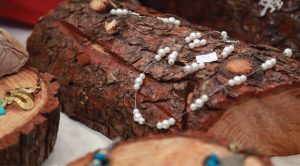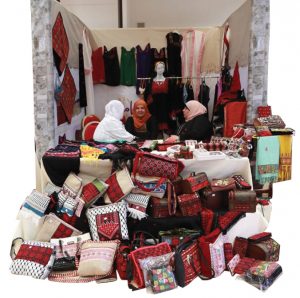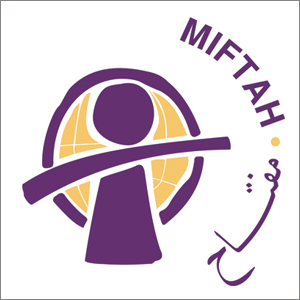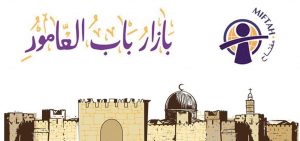The Palestinian Initiative for the Promotion of Global Dialogue and Democracy − MIFTAH, in cooperation with the Arab Fund for Economic and Social Development, implements small income-generating projects for women in marginalized areas in East Jerusalem. This support is part of MIFTAH’s “Women’s Economic Program” and constitutes one of its empowerment initiatives that promote the participation of women at all levels of society. The project aims to contribute to the development of local communities in rural areas, especially those located in Area C. It targets predominantly young women, providing them with training that enables them to play an effective and active role in endeavors that elevate the status of women in these communities. In several Jerusalem-area villages, this program aims also to combat poverty and unemployment among women and their families, thereby contributing to national efforts that focus on encouraging citizens to remain steadfast on their land.
The Women’s Economic Program began to be implemented in 2008 and has changed the lives of over 450 women and their families. It comes as a continuation of MIFTAH’s support to impoverished Palestinian women in areas that are exposed daily to the detrimental effects of settlement expansion and land confiscation. These measures double the burden on the women living in these areas because they hamper their access to basic services, which has a heavy impact on their daily lives.

Fatimeh Morrar and Jamalat Daoud from the village Beit Dukko, located northwest of Ramallah, ascribe the success of their jewelry and accessories business to a large extent to the support that MIFTAH has extended to their project since 2016. They appreciate that MIFTAH has kept up with their progress and development, helping them overcome the challenges that they have faced. Other project beneficiaries feel the same. Initially, the project supported five women and girls from the village; this number had risen to ten by late 2018. Morrar, also a member of the Beit Dukko Development Association, notes that most of the challenges they face have to do with marketing their products, even though they enjoy a measure of popularity given that they are heritage-themed accessories that highlight Palestinian history and culture.
The Women’s Economic Program raises hopes amidst a variety of challenges.
Morrar commended MIFTAH’s continuous support over the past three years that has benefitted two groups of ten women and girls from the village who completed training in the manufacture of jewelry and accessories and received instruction in management and marketing. Today, these women work inside and outside the village and train other girls and women, as demand on their products is high, with many people desiring to possess items that display and celebrate their heritage.

Both Morrar and Daoud assert that this project produces numerous positive returns, including financial and social rewards for girls and women in Beit Dukko. They maintain that first, it provides them with a steady income that significantly augments the family’s income, empowering them economically as it allows them to contribute to the well-being of the family. Furthermore, the project provides social returns because the beneficiaries are introduced to various social sectors, broadening their circle of relations and influence through their participation in exhibits and local bazaars that showcase their products. The positive returns and benefits of the project have continuously increased for the beneficiaries, especially after MIFTAH carried out several interventions that include networking with the Business Women Forum on behalf of the project and involving the women in local and international bazaars.
Poverty rates increased from 8.1 percent in Area C in the year 2000 to 18.3 percent in 2011, with labor force participation rates in the field of agriculture dropping from 44 percent to 23.5 percent for the same period.
“Marketing was one of our most significant challenges,” Morrar reveals, affirming that MIFTAH played an important role in overcoming this challenge by holding more exhibits and marketing the products abroad. One such event was the “Damascus Gate Bazaar” that took place in late 2017 and introduced the broader local society to their products. “The networking and public relations efforts carried out by MIFTAH were extremely important, especially holding bazaars abroad, which contributed to expanding the market for our products and generating even greater income for the beneficiaries.”
MIFTAH’s choice of the Ein Louza neighborhood in the town of Silwan, south of Al-Aqsa Mosque, to implement the food-production project was no coincidence. It chose this quarter, one of the poorer areas of Silwan, for the implementation of its project to support a number of local women and empower them economically. The project was a major success, and organizers were well aware of the significance and implications of implementing this project in terms of timing and impact on the beneficiaries and their families. It emphasized the importance of supporting Palestinian women in occupied Jerusalem, economically empowering them in an extremely difficult climate for families as they are faced with the weight of the Israeli occupation and its policy of undercutting their very means of living in order to undermine their steadfastness.
Poverty rates increased from 8.1 percent in Area C in the year 2000 to 18.3 percent in 2011, with labor force participation rates in the field of agriculture dropping from 44 percent to 23.5 percent for the same period.
The food-production project, entitled “Delicious Jerusalem Bites,” was launched in November 2018, and involved five women from the Ein Louza neighborhood. From the start, the beneficiaries experienced success. At first, the returns were humble, but with positive reception from the community, these returns have been on the rise ever since. Fa’eda Halabiyeh, one of the five beneficiaries, explains: “The project includes pastries and other homemade products that we market in our local community based on orders. We provide ready, home-cooked meals to many households.” She explains how the group of five first started out through a women’s center that reached out to MIFTAH, which “provided us with all the support we needed.” Since then, Halabiyeh says, the five women have each been able to secure a steady income. “We started with around NIS 200 a month, then we went up to NIS 500, and then NIS 700. “Today, our monthly take-home salary is NIS 1,000 each, and we expect this to go up even more in the coming months,” she says proudly, explaining that these are net salaries after store rent, utility bills, and other project-related expenses have been paid.
Settlement expansion in East Jerusalem is directly linked to the evacuation of Palestinians from their homes and their forced displacement, in addition to expropriation of land and property, which hinders access to resources. Settlement construction and expansion in East Jerusalem commenced in 1968. Statistics from 2016 indicate that there were 220,000 settlers in 12 settlements inside the wall.
Fa’eda Halabiyeh says she hopes that the project will expand and multiply in profits for the beneficiaries, noting that they are all housewives who contribute financially to the household. The most significant impact, she notes, is that the project has boosted their confidence by building trusting relationships with their community. “Here, we make all sorts of food – different types of pickles and sweets all of all kinds – and take orders for ready-made meals, including pastries such as mini pizzas at NIS 1 a piece. Most of our customers are students from nearby schools.”
As with any start-up, there are always challenges. Halabiyeh says that theirs are compounded by the fact that they live in Jerusalem and in Silwan in particular. “It is one of the towns targeted daily by Israeli tax raids, closures, settler and army attacks, etc. This is in addition to the challenges that we face regarding high rents,” Halabiyeh continues. “We work really hard just to collect enough money to rent the place, and before we know it, the landlord is knocking on our door asking for rent again.” Still, she maintains, “the challenges only make us stronger. This experience has made us more self-confident; we have won the respect and trust of our community, especially the women.”



